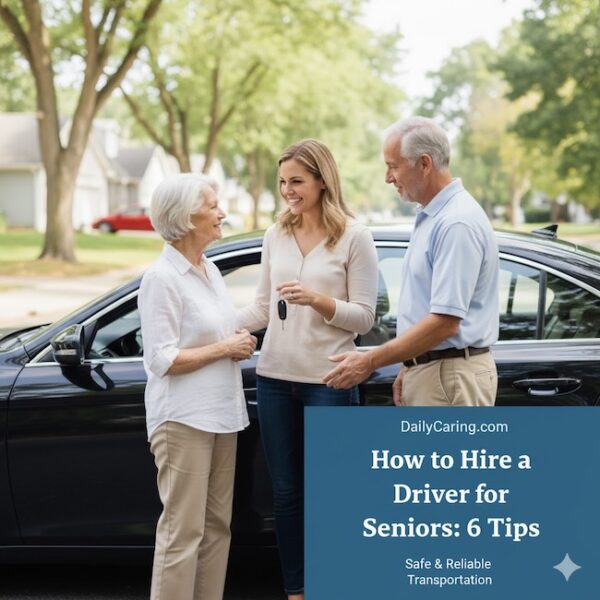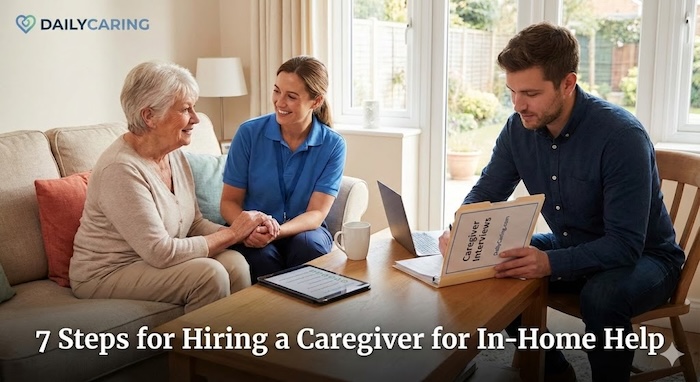Handing over the car keys is one of the most emotionally charged transitions in an aging adult's life, symbolizing a loss of independence that can be deeply felt. Yet, the need for safe, reliable transportation doesn't disappear.
For a family caregiver, the prospect of hiring a driver can be equally daunting. It's not just about finding someone with a clean driving record; it's about entrusting a stranger with your loved one's physical safety and emotional well-being on the open road.

How can you be sure you're making the right choice? By focusing on these six essential tips, you can move from a place of anxiety to one of confidence, finding a driver who is not just a safe operator of a vehicle but a trustworthy companion.
Seniors Need Safe, Reliable Transportation and Assistance
When your older adult can’t safely drive themselves, one option is hiring a caregiver to drive them.
An in-home caregiver who is willing to drive can take seniors to appointments, run errands, and visit family and friends.
This is especially helpful when you or other family members aren’t available to take them out.
Having reliable transportation and someone to accompany them helps seniors stay as healthy and independent as possible. It also protects them from becoming isolated or depressed.
We’ve got six tips to help you find a great caregiver who will safely and reliably drive your older adult around town.
6 Tips for Hiring a Caregiver to Drive an Aging Parent
1. Ask about their driving record and history
Before letting someone drive your loved one, it’s essential to determine whether they’re a safe, responsible driver.
Ask about their driving record and take notes on their responses. Also, write down the information on their current driver's license or take a photo of it.
When you ask about their experience driving seniors, focus on questions like:
- Have you driven for an older adult before? For how long?
- What were your best and worst driving experiences with seniors?
2. Check the DMV Driving Record
When hiring a caregiver to drive your older adult, it’s a good idea to get a copy of their official Department of Motor Vehicles (DMV) driving record.
This also gives you a chance to compare the information they gave you with the official record to make sure everything matches.
Request their DMV driving record by calling your state’s DMV or visiting their website.
Keep in mind that the DMV record will only include their driving history in that state. It won’t cover incidents in other states, so if you know they've lived in other states, you may want to get those records as well.
The DMV record check verifies the status of their driver's license, expiration date, and license type and class.
It also tells you if there are any restrictions, suspensions, or revocations, violations, accidents, or DUIs.
VIDEO: How to Hire a Driver for Seniors
3. Ask Situational Questions
A great way to assess a caregiver’s driving is to ask questions about what they would do in situations that could arise.
This helps them understand the type of care situation they’re getting into and enables you to find out how they would react when something unexpected happens.
Base these questions on your older adult’s typical behaviors and health conditions.
For example, what would the caregiver do if your older adult…
- Suddenly refuses to leave the house for their doctor appointment
- Starts getting angry or yelling while the caregiver is driving
- Urgently needs to use the restroom or has an accident
- Starts feeling ill or unwell
- Becomes weak in the legs while out in public and can’t walk back to the car, even with assistance
- Refuses to put on their seat belt
- Unbuckles their seat belt while the caregiver is driving
Take notes on their answers and whether or not they match the approach you would take in that situation.
If you live in an area with bad weather —like heavy rain, thunderstorms, or snow —ask about their experience driving in such conditions.
You’ll want to feel that they can handle bad weather (on top of distractions from your older adult) safely and with good judgment.
If they’ll be driving their own car, you may also need to find out whether it has the right equipment for bad weather, like working windshield wipers, emergency blinkers, snow tires, and an ice scraper.
4. Decide Whose Car Will Be Driven
Before hiring someone, you’ll need to figure out whose car will be used.
If your loved one has a car but needs a driver, you don’t need to ask the caregiver to provide their car or check it for safety.
But if you do need someone who has their own car, make sure they have auto insurance first. Then, look over their vehicle to ensure it’s safe for your older adult and that it can seat them comfortably.
Ask if the car is regularly maintained and if they have roadside assistance in case the car breaks down. You should also discuss how to reimburse them for gas and mileage.
Note: If the caregiver will be driving your loved one's car, you’ll need to notify their auto insurance company.
5. Have Them Take You on a Test Drive
It’s wise to have the caregiver take you on a drive as if they were driving an older adult.
Have them take you to and from a place your older adult frequently visits, like the doctor’s office, grocery store, or pharmacy.
Go at the same time of day your loved one would be going out to see how they handle any traffic or road construction.
Pay attention to their driving style and how you’re feeling in their car.
Your gut is a good judge – do you feel normal, or are you stressed and stomping on an imaginary brake pedal?
Usually, chat with them to see how they handle driving while conversing. Also, watch to see if they use their mobile phone while driving.
Warning signs of a poor driver include speeding, hard braking, aggression, and talking or texting on their phone.
In addition, take a look at their car to see if there are dents or scrapes; those could be additional signs of unsafe driving.
6. Discuss and Agree to Clear Ground Rules
Before having someone drive your loved one, set clear ground rules.
These are especially important if your older adult has dementia and isn’t able to make good decisions on their own.
Rules could include:
- Specific destinations are strictly off-limits, like bars or betting locations
- Driving at night is not allowed
- No other people are allowed in the car unless previously approved by you
- The caregiver can’t run personal errands while driving an older adult
- The caregiver can’t use their mobile phone while driving
Document these ground rules and expectations in an employment contract so there won’t be any misunderstandings.
Final Thoughts on Finding a Driver for an Older Adult
Finding the right driver is an investment that pays dividends in freedom and peace of mind. When you hire a caregiver who is both a skilled driver and a compassionate companion, you are giving your loved one the gift of mobility and yourself the gift of time and reduced worry.
This person becomes a crucial link to the outside world—to doctors' appointments, social engagements, and the simple joy of a change of scenery. Trust the vetting process you've undertaken, listen to your instincts, and know that this decision is a profound step toward sustaining your loved one's independence while lightening your own load.
The right driver doesn't just take them from point A to point B; they help keep their world open and connected.
Recommended for you:
- 6 Affordable Senior Transportation Options
- 7 Steps for Hiring a Caregiver for In-Home Help
- 5 Ways to Keep an Eye on Your Senior’s In-Home Caregiver
About the Author

Connie is the founder of DailyCaring.com and was a hands-on caregiver for her grandmother for 20 years. (Grandma made it to 101 years old!) She knows how challenging, overwhelming, and all-consuming caring for an older adult can be. She also understands the importance of support, especially in the form of practical solutions, valuable resources, and self-care tips.














I sold my car because I had a medical accident and don’t feel safe driving
We’re sorry to hear about your medical accident. It’s a wise choice to stop driving and sell your car to prevent future accidents.
If you are having a caregiver drive a senior’s car, you need to review your auto insurance coverage to ensure legal responsibility/liability for potential accidents and injuries or damages involved. Call your insurance agent, asap!
Excellent tip! Thank you for sharing.